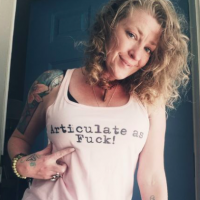Nobody wants to consider that, maybe, they are the jerk in a relationship.
It’s easier to blame the other person. It’s easier to say that we grew apart.
It’s easier to say, “It’s not me.”
Over the last 24 hours I have received similar feedback from two separate people who are important to me. The gist of what was divulged is that, in a relationship, I am a taker. These are not romantic connections. They are both women. I have known one of them for three-fourths of my life. The other was a developing friendship.
Sure, I’d like to blow this off and chock it up to projection or incompatibility and there may be some of that involved. However, the feedback was too similar. This bears further introspection and investigation.
I consider myself warm, attentive, kind, curious, and empathic.
I have, in the past, functioned too heavily on the empathic scale. I have been overly sensitive—debilitatingly so. This extreme sensitivity was the root of behaviors that manifested as OCD like symptoms in my youth. It also led to addictive dynamics with both people and substances.
When I look back—when I feel back through my body—I can remember a sense of unease that was present with me for most of my life.
Is feeling uneasy beneath our skin grounds for being an inconsiderate asshole? No. But it does lead to a disconnect within ourselves and with others.
Recently, I came across a post on social media that was talking about the shadow, a term coined by Carl Jung to denote our underlying, often undesirable, psychological characteristics, behaviors, and tendencies. These are usually the things that we don’t like about ourselves, qualities that have been deemed socially unacceptable, unsafe, or taboo.
The post posited that the shadow can best be pinned down by a simple question: “What are the qualities that friends would say they don’t like about you?”
I jumped in and replied with, “I can be a bit narcissistic, especially when triggered. I can be selfish, self-absorbed, inconsistent with communication, defensive, and have been (on and off) dissociating for most of my life.”
I know myself pretty well. Regrettably, my self-gnosis doesn’t always translate to change. It takes time, patience, courage, and support to shift deeply embedded psychological and behavioral patterns, and that doesn’t happen on anyone else’s schedule. It happens as we are able to grow our emotional and neurological capacity.
I am aware of my own obnoxious level of self-involvement. As for using people, there I feel a bit confused as it seems to me that most of my life I have been the one who was used. In a former relationship, I took on all the financial responsibilities (so that he could find himself as an artist) to the point where, when I did finally ask for help or, more accurately, demanded it, I was struggling to keep us above water and I was frankly growing resentful.
Resentment is what builds in relationships when we do not express our needs and desires, and hold—with clarity and integrity—our yes and no.
In the lifelong friendship, this pattern was established in childhood. She used to want to stay over all the time and, on occasion, I would pretend to go ask my mom and come back and tell her that my mom had said no.
I have had a hard time with saying no. I don’t want to hurt anyone. I don’t want to disappoint anyone. I have, however, noticed that having a hard time saying no outwardly is reflective of me having a hard time saying no inwardly to myself. For most of my life, I have struggled with structure.
Perhaps, in part, these friendships were lacking that container. Perhaps we did not feel that we could say yes or no to each other depending on our shifting needs. Consent is an important part in any relationship.
I would not have been able to move through so much of my anxiety—years of stored emotional, physical, and relational distress—without the support of my best friend.
When I received this distressing feedback about how I have been perceived to function with these two female friends, I immediately went to my bestie to ask if that had been his experience with me. He said no. But he pointed out that I tend to ask him if he has the space to hear my sh*t before I unload.
There have been times when he has told me that he did not have the space to listen at that moment. The desperate squirmy child within me never wants to hear no. However, the adult in me, who has been consciously learning how to regulate my nervous system for a couple of years now, knows that I am alright and that I can wait. And I will, at some point, need to be witnessed.
Witnessing people in a state of distress and helping them come to a place of resolution and stability through shared emotional and neurological regulation is a key component of my own work. It is that very same practice that has facilitated my own healing both in and out of therapy.
I asked another friend, a man, if he perceived or experienced this imbalance (spoken of by my two women friends) in our friendship. He, too, said no. He professed great value in the way that I share myself and that he, himself, had been inspired to do so more in his own intimate relationship, in part, thanks to our conversations.
It’s curious to me that the men in my life seem to feel that our friendships are in balance whereas two of the women who I consider important to me do not. It makes me wonder if this imbalance is gender specific and if I have fallen into an unconscious tendency of trying to get the women in my life to pull more of my own emotional labor than is appropriate. It might make sense as that is what was modeled to me as a child.
Truthfully, though, until recently, I did not receive, nor was able to engage in, any kind of co-regulation with either of my parents. And until almost just as recently, I had never experienced it in a romantic relationship either.
It makes me sad to acknowledge that I have made it into my early 40s without more deep, intimate connections. It makes me even sadder to realize that my own behaviors, defensiveness, and self-absorption have contributed to their absence in my life.
I’m not sure what to do with this information I have received except to take it in—to become more curious about my impact on people, to take more accountability for those effects, and to do a better job tending to the people who matter to me.
~












Read 24 comments and reply